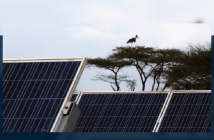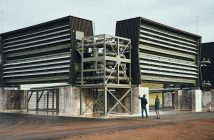- A new report released by Friends of the Earth U.S. and Oil Change International reveals South Africa provided at least ZAR 2.2 billion (USD 153 million) a year in trade and development finance for coal projects 2016 to 2018.
- Poor transparency from DBSA, IDC, and ECIC means support for oil, gas, and coal likely higher than the ZAR 2.2 billion a year on record.
As South Africa prepares stimulus packages in response to COVID-19, ‘Still Digging’ highlights that its public finance to date has not been aligned with a job-rich, clean energy future. The report urges South Africa and other G20 governments to stop using public money to prop up the fossil fuel industry, and instead invest in a just and sustainable recovery.
The report analyzes support coming from G20 export credit agencies (ECAs) and development finance institutions (DFIs), as well as the major multilateral development banks (MDBs) from 2013 to 2018. For South Africa, this includes the Development Bank of Southern Africa (DBSA), the Industrial Development Corporation of South Africa (IDC), and the Export Credit Insurance Corporation (ECIC).
‘Still Digging’ notes that poor transparency from DBSA, IDC, and ECIC means support for oil, gas, and coal is likely higher. This finding was underscored by the results of a study released by the Centre for Environmental Rights (CER) in May which found the investment policies of DBSA and IDC fall far short of international social, environmental and governance standards. Both of these reports have coincided with the launch of a public campaign by 350Africa.org for people to call on IDC and DBSA commit to stop financing fossil fuels.
Since the end of the study period in 2018, South Africa’s public finance institutions have announced support for Total’s Mozambique LNG and MC Mining’s Makhado coal mine among other new fossil fuel projects that are not reflected in the study. The report also does not include the G20’s direct subsidies for the industry through tax and fiscal subsidies, which are an estimated additional ZAR 1.1. trillion (USD 80 billion) a year. South Africa’s direct subsidies for coal alone are about ZAR 58 billion (USD 4.1 billion) a year, with nearly all of this made up of support to Eskom.
Some of the key findings include:
- G20 support for fossil fuels has not dropped since the Paris Agreement was made. Total public finance from G20 countries and MDBs for fossil fuels stayed steady at about ZAR 1.1 trillion (USD 77 billion) in 2016-2018 compared to 2013-2015, alarming at a time when avoiding the worst of climate change means no new finance should flow to oil, gas, or coal. China, Japan, Canada, and South Korea were the largest providers of public finance to fossil fuels, together making up over two-thirds of the G20 total.
- G20 support for coal climbed. Efforts to reduce coal financing were dealt a significant setback, with the annual average support for coal from G20 countries increasing by ZAR 18.4 billion (USD 1.3 billion) in 2016-2018 compared to 2013-2015. In South Africa, the level of public finance for coal that was reported nearly tripled, from ZAR 792 million (USD 56 million) a year in 2013-2015 to ZAR 2.1 billion (USD 151 million) in 2016-2018.
- While progress needs to be dramatically scaled up, some institutions are leading the way in phasing out fossil fuel investments.The United Kingdom, Canada, France and three MDBs have enacted full or near-full restrictions on direct coal financing, and 14 others have partial restrictions. For oil and gas, the European Investment Bank has a near complete commitment to exclude new support, while France, Germany, Brazil, and six of the eight other multilateral development banks have partial restrictions.
“Fossil fuel corporations know their days are numbered. Their lobbyists are using the COVID-19 crisis as cover to redouble their efforts to secure the massive new government handouts they need to survive,” said Thuli Makama, Africa Senior Adviser at Oil Change International. “South Africa’s public finance must instead support a just transition from fossil fuels that protects workers, communities, and the climate — both at home and beyond its borders — in order to build a more resilient future. Instead of bankrolling another major crisis — climate change — South Africa should invest in the future.”
The report, entitled “Still Digging: G20 Governments Continue to Finance the Climate Crisis,” can be found here.
Author: Bryan Groenendaal
Source: Priceofoil












